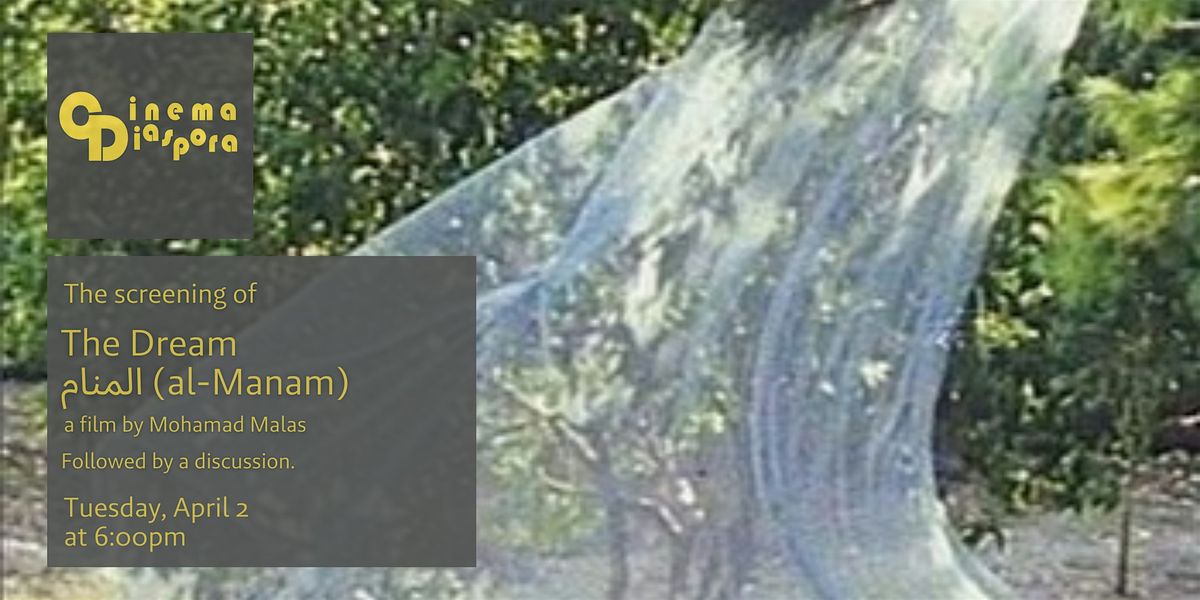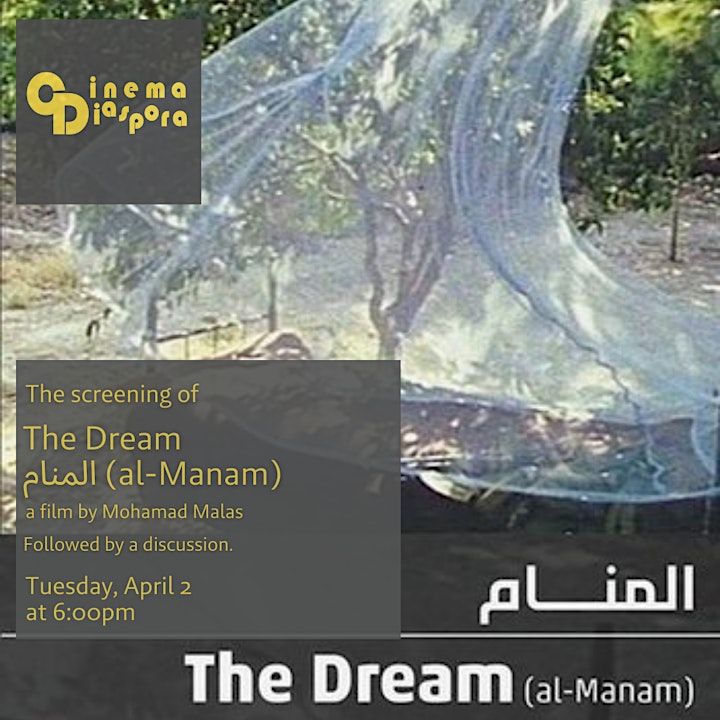
About this Event
The Syrian cinema has been limited to individual experiments, limited names, and specific eras without continuity and development at the industry level. Unlike television drama, which has reached strong competition with regional drama and continues to compete variably despite the recent challenges.
We discuss these ideas and others with the new Ramadan season, along with watching a film from the Syrian memory.
This week, we present a film by the Syrian filmmaker Mohammed Malas, who remained faithful with his camera to the Syrian street and the Arab citizen and their issues, through a film about the suffering of Palestinians called "The Dream". We present this film in the Diaspora Cinema while the tragedy continues for the people of Gaza.
--
The film was shot in 1980-1981 and consists of interviews with various Palestinian refugees including children, women, elderly, and armed individuals from refugee camps in Sabra, Shatila, Burj El-Barajneh, Ain El-Hilweh, and Rashidieh in Lebanon. In the interviews, Mohammed Malas asks them about their dreams at night. Dreams always intersect with Palestine: a woman narrates her dreams of winning the war; a freedom fighter speaks of bombing and martyrdom; and one man talks about a dream where he meets and is ignored by Gulf princes. During filming, Malas lived in the camps and conducted interviews with over 400 people. In 1982, the Sabra and Shatila massacres occurred, claiming the lives of many of those he had met, and the project was halted. He returned to it in 1986 and edited numerous hours of footage collected into this 45-minute film, which was released in 1987.
Documentary film, Mohammed Malas, Syria 1987, 45 minutes, Arabic with translation into various languages.
Director: Mohammed Malas | Camera: Hazem Bayaa, Hanna Ward | Editing: Qais Al-Zubaidi
Award:
Creativity and Innovation Award - International Festival of Audiovisual Programs Cannes, France
"The Dream film, an important cinematic documentary, a great film, worthy of revisiting at all times, calls for stopping in front of it, contemplating it, and reflecting on its words, perhaps we may see the contexts to which the Palestinian conditions have led, in what has been experienced from days and events, in a way that shows us how the dreams of Palestinians were at one time, and where they have gone... with their disappointments and setbacks... Introducing a quest to answer the question: Why?!.. And how?!.." - Al Jazeera Documentary.
--
(FR)
Le cinéma syrien s'est limité à des expériences individuelles, à des noms restreints et à des époques spécifiques sans continuité ni développement au niveau de l'industrie. Contrairement au drame télévisé, qui a réussi à rivaliser avec le drame régional de manière significative et continue à rivaliser de manière variable malgré les récents défis.
Nous discutons de ces idées et d'autres avec la nouvelle saison de Ramadan, tout en regardant un film de la mémoire syrienne.
Cette semaine, nous présentons un film du cinéaste syrien Mohammed Malas, qui est resté fidèle avec sa caméra à la rue syrienne et au citoyen arabe et à leurs problèmes, à travers un film sur la souffrance des Palestiniens appelé "Le Rêve". Nous présentons ce film au Cinéma Diaspora tandis que la tragédie continue pour le peuple de Gaza.
--
Le film a été tourné en 1980-1981 et se compose d'entretiens avec divers réfugiés palestiniens, y compris des enfants, des femmes, des personnes âgées et des individus armés des camps de réfugiés de Sabra, Shatila, Burj El-Barajneh, Ain El-Hilweh et Rashidieh au Liban. Dans les entretiens, Mohammed Malas leur demande à propos de leurs rêves pendant la nuit. Les rêves se croisent toujours avec la Palestine : une femme raconte ses rêves de gagner la guerre ; un combattant de la liberté parle de bombardements et de martyre ; et un homme parle d'un rêve où il rencontre et est ignoré par les princes du Golfe. Pendant le tournage, Malas a vécu dans les camps et a mené des entretiens avec plus de 400 personnes. En 1982, les massacres de Sabra et Shatila ont eu lieu, faisant de nombreuses victimes parmi ceux qu'il avait rencontrés, et le projet a été interrompu. Il y est retourné en 1986 et a monté de nombreuses heures de séquences collectées dans ce film de 45 minutes, qui est sorti en 1987.
Film documentaire, Mohammed Malas, Syrie 1987, 45 minutes, en arabe avec traduction dans différentes langues. Réalisateur : Mohammed Malas | Caméra : Hazem Bayaa, Hanna Ward | Montage : Qais Al-Zubaidi
Récompense : Prix de la Créativité et de l'Innovation - Festival International des Programmes Audiovisuels Cannes, France
"Le film Le Rêve, un documentaire cinématographique important, un grand film, méritant d'être revisité à tout moment, appelle à s'arrêter devant lui, à le contempler et à réfléchir à ses mots, peut-être verrons-nous les contextes auxquels les conditions palestiniennes ont conduit, dans ce qui a été vécu comme jours et événements, de manière à nous montrer comment étaient les rêves des Palestiniens à un moment donné, et où ils sont allés... avec leurs déceptions et leurs revers... Introduisant une quête pour répondre à la question : Pourquoi ?!.. Et comment ?!.." - Al Jazeera Documentaire.
--
(AR)
اقتصرت السينما السورية على تجارب فردية، اسماء محدودة، وحقب معينة من دون ان يكون لها استمرارية وتطور على مستوى الصناعة. على عكس دراما التلفزيون التي وصلت لمنافسة دراما المنطقة بشكل قوي ولازالت تنافس بشكل متباين رغم العقد الاخير
نناقش هذه الافكار وغيرها، مع الموسم الرمضاني الجديد مع مشاهدة فيلم من الذاكرة السورية
نعرض هذا الاسبوع فيلما للسينمائي السوري محمد ملص الذي ظلّ وفياً كاميرته للشارع السوري وهم المواطن العربي وقضاياه، من خلال فيلم حلم عن معاناة الفلسطينيين. نقدم في سينما دياسبورا هذا الفلم بينما المحرقة مستمرة بحق أهالي غزة.
--
تم تصوير الفيلم في ١٩٨٠-١٩٨١ ، وهو يتألف من مقابلات مع مختلف اللاجئين الفلسطينيين بمن فيهم الأطفال والنساء وكبار السن ومسلحون من مخيمات اللاجئين في صبرا وشاتيلا وبرج البراجنة وعين الحلوة والراشدية في لبنان. في المقابلات ، يسألهم محمد ملص عن أحلامهم في الليل. الأحلام تتلاقى دائمًا مع فلسطين: امرأة تحكي أحلامها عن كسب الحرب ؛ فدائي عن القصف والاستشهاد ؛ ورجل واحد يحكي عن حلم يقابله ويتجاهله أمراء الخليج. أثناء التصوير ، عاش ملص في المخيمات وأجرى مقابلات مع أكثر من ٤٠٠ شخص. في عام ١٩٨٢ وقعت مجازر صبرا وشاتيلا ، راح ضحيتها العديد من الأشخاص الذين قابلهم ، وتوقف عن العمل في المشروع. عاد إليها في عام ١٩٨٦ وقام بتحرير العديد من ساعات اللقطات التي جمعت في هذا الفيلم الذي استمر لمدة 45 دقيقة ، والذي صدر في عام ١٩٨٧.
فيلم وثائقي ، محمد ملص ، سوريا ١٩٨٧ ، ٤٥ دقيقة ، العربية مع ترجمة إلى لغات مختلفة
المخرج محمد ملص | الكاميرا حازم بياعة ، حنا ورد | مونتاج قيس الزبيدي
الجائزة
جائزة الابداع والتجديد - المهرجان الدولي للبرامج السمعية البصرية كــان – فرنسا
«فيلم المنام، الوثيقة السينمائية الهامة، فيلم كبير، يستحق الاستعادة في كل وقت، وكل حين، ويستدعي التوقف أمامه، والتأمل فيه، والتبصر في قولاته، لعل نرى السياقات التي ذهبت إليها الأحوال الفلسطينية، فيما تلا من أيام وأحداث، بالشكل الذي يبين لنا، كيف كانت أحلام الفلسطينيين ذات وقت، وإلى أين مضت.. بخيباتها وانكساراتها.. مقدمة لبحث إجابة السؤال: لماذا؟!.. وكيف؟!..» الجزيرة الوثائقية.

Event Venue & Nearby Stays
Kawalees Cultural Cabaret, 5175A Avenue du Parc, Montréal, Canada
CAD 0.00
